There
are a lot of scary things happening these days, but here’s what keeps
me up late at night. A handful of corporations are turning our open
internet into this:
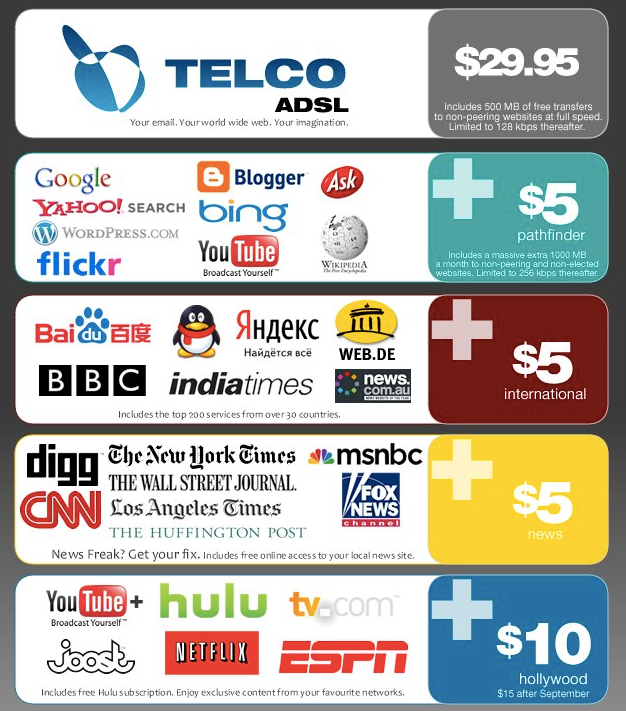
These
corporations want to lock down the internet and give us access to
nothing more than a few walled gardens. They want to burn down the
Library of Alexandria and replace it with a magazine rack.
Why? Because they’ll make more money that way.
This may sound like a conspiracy theory, but this process is moving forward at an alarming rate.
History is repeating itself.
So
far, the story of the internet has followed the same tragic narrative
that’s befallen other information technologies over the past 160 years:
- the telegram
- the telephone
- cinema
- radio
- television
Each of these had roughly the same story arc:
- Inventors discovered the technology.
- Hobbyists pioneered the applications of that technology, and popularized it.
- Corporations took notice. They commercialized the technology, refined it, and scaled it.
- Once the corporations were powerful enough, they tricked the government into helping them lock the technology down. They installed themselves as “natural monopolies.”
- After a long period of stagnation, a new technology emerged to disrupt the old one. Sometimes this would dislodge the old monopoly. But sometimes it would only further solidify them.
This
loop has repeated itself so many times that Tim Wu — the Harvard law
professor who coined the term “Net Neutrality” — has a name for it: The Cycle.
“History shows a typical progression of information technologies, from somebody’s hobby to somebody’s industry; from jury-rigged contraption to slick production marvel; from a freely accessible channel to one strictly controlled by a single corporation or cartel — from open to closed system.” — Tim Wu
And right now, we’re in step 4 the open internet’s narrative. We’re surrounded by monopolies.
The
problem is that we’ve been in step 4 for decades now. And there’s no
step 5 in sight. The creative destruction that the Economist Joseph
Schumpeter first observed in the early 1900s has yet to materialize.
The
internet, it seems, is special. It’s the ultimate information
technology — capable of supplanting the telegram, telephone, radio,
cinema, television, and much more — and there’s no clear way to disrupt
it.
But
the war for the commanding heights of the internet is far from over.
There are many players on this global chess board. Governments. Telecom
monopolies. Internet giants like Google and Facebook. NGOs. Startups.
Hackers. And — most importantly — you.
The
war for the open internet is the defining issue of our time. It’s a
scramble for control of the very fabric of human communication. And
human communication is all that separates us from the utopia that
thousands of generations of our ancestors slowly marched us toward — or
the Orwellian, Huxleyan, Kafkaesque dystopia that a locked-down internet
would make possible.
By
the end of this article, you’ll understand what’s happening, the market
forces that are driving this, and how you can help stop it. We’ll talk
about the brazen monopolies who maneuver to lock down the internet, the
scrappy idealists who fight to keep it open, and the vast majority of
people who are completely oblivious to this battle for the future.
In Part 1, we’ll explore what the open internet is and delve into the history of the technological revolutions that preceded it.
In Part 2, we’ll talk about the atoms.
The physical infrastructure of the internet. The internet backbone.
Communication satellites. The “last mile” of copper and fiber optic
cables that provide broadband internet.
In Part 3, we’ll talk about bits.
The open, distributed nature of the internet and how it’s being
cordoned off into walled gardens by some of the largest multinational
corporations in the world.
In Part 4, we’ll explore the implications of all this for consumers and for startups. You’ll see how you can help save the open internet. I’ll share some practical steps you can take as a citizen of the internet to do your part and keep it open.
This is a long read. So grab a hot beverage and get ready to download a massive corpus of technology history into your brain.
Part 1: What is the open internet?

There’s only one word to describe the open internet: chaos.
The
open internet is a cacophony of 3 billion voices screaming over one
another. It’s a dusty, sprawling bazaar. And it’s messy. But it has
produced some of the greatest art and industry of our time.
The open internet is a Miltonian marketplace of ideas, guided by a Smithian invisible hand of free-market capitalism.
The
open internet is distributed. It’s owned in part by everyone and in
whole by no one. It exists largely outside of the boundaries of
governments. And it’s this way by design.
This reflects the wisdom of Vint Cerf, Bob Khan, J. C. R. Licklider, and all the wizards who stayed up late
and pioneered the internet. They had seen the anti-capitalist,
corporatists fate that befell the telegram, the telephone, the radio,
and the TV. They wanted no part of that for their invention.
The open internet is a New Mexico Quilter’s Association. It’s a Jeremy Renner fan club. It’s a North Carolina poetry slam. It’s a Washington D.C. hackerspace. It’s a municipal website for Truckee, California. It’s a Babylon 5 fan fiction website.
The
open internet is a general purpose tool where anyone can publish
content, and anyone can then consume that content. It is a Cambrian
Explosion of ideas and of execution.
Can
these websites survive in a top-down, command-and-control closed
internet? Will they pay for “shelf space” on a cable TV-like list of
packages? Will they pay for a slice of attention in crowded walled
gardens?
We’re all trapped in The Cycle
Here’s
a brief history of the information technologies that came before the
internet, and how quickly corporations and governments consolidated
them.
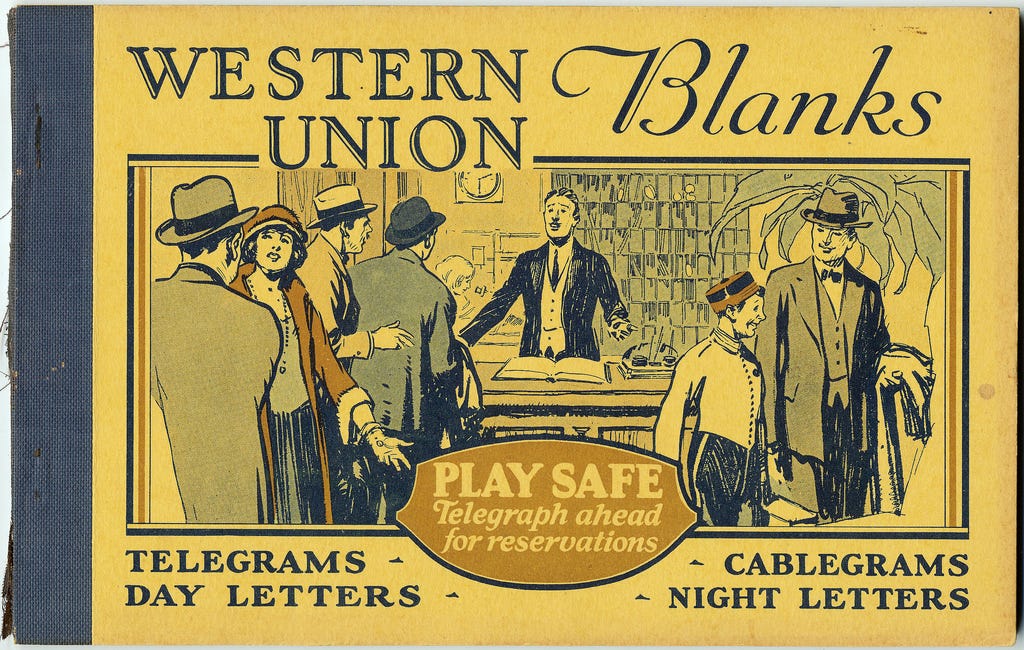
Originally
anyone could string up some cable, then start tapping out Morse Code
messages to their friends. The telegram was a fun tool that had some
practical applications, too. Local businesses emerged around it.
That changed in 1851 when Western Union strung up transcontinental lines and built relay stations between them.
If
small telegraph companies wanted to be able to compete, they needed
access to Western Union’s network. Soon, they were squeezed out
entirely.
At
one point Western Union was so powerful that it was able to
single-handedly install a US President. If you grew up in America, you
may have memorized this president’s name as a child: Rutherford B.
Hayes.
Not
only did Western Union back Hayes’ campaign financially, it also used
its unique position as the information backbone for espionage purposes.
It was able to read telegrams from Hayes’ political opponents and make
sure Hayes was always one step ahead.
Western
Union’s dominance — and monopoly pricing — would last for decades until
Alexander Graham Bell disrupted its business with his newly-invented
telephone.
How the telephone fell victim to The Cycle
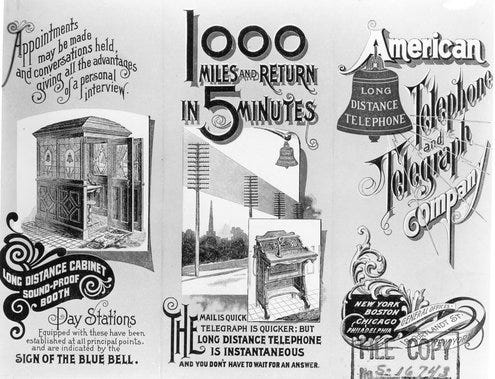
After
a period of party lines and local telephone companies,
AT&T — backed by JP Morgan — built a network of long-distance lines
throughout America.
In
order for the customers of local phone companies to be able to call
people in other cities, those companies had to pay AT&T for the
privilege of using its long-distance network.
Theodore
Vail — a benevolent monopolist if there ever was one — thought that
full control of America’s phone systems was the best way to avoid messy,
wasteful capitalistic competition. He argued that his way was better
for consumers. And to be fair, it was. At least in the short run.
Vail
was able to use AT&T’s monopoly profits to subsidize the
development of rural phone lines. This helped him rapidly connect all of
America and unify it under a single standardized system.
But
the problem with benevolent monopolists is they don’t live forever.
Sooner or later, they are replaced by second-generation CEOs, who often
lack any of their predecessors’ idealism. They are only after one
thing — the capitalist’s prerogative — maximizing shareholder value.
That means making a profit, dispersing dividends, and beating quarterly
earnings projections. Which means extracting as much money from
customers as possible.
AT&T
eventually squeezed out their competitors completely. And once
AT&T’s monopoly became apparent, the US Government took action to
regulate it. But AT&T was much smarter than its regulators, and
jumped on an opportunity to become a state-sponsored “natural monopoly.”
AT&T would enjoy monopoly profits for decades before being broken up by the FCC in 1982.
But the “baby bells” wouldn’t stay divided for long. In 1997, they were able to start merging back together into a corporation even bigger than before the break-up.
The
end result is one of the most powerful corporations on the
planet — strong enough to expand its monopoly from the land-line
telephone industry to the emerging wireless telecom industry.
AT&T
functioned like a branch of government and had extensive research labs,
but with one major exception — it could keep secret any inventions that
it perceived as a threat to its core business.
Voicemail
— and digital tape, which was later used as a critical data storage
medium for computers — was actually invented within one of AT&T’s
labs in 1934. But they buried it. It was only re-invented decades later.
Imagine
how much progress the field of information technology could have made
during that length of time with such a reliable and high-volume data
storage medium at its disposal.
To
give you some idea of how much just this one AT&T decision may have
cost humanity, imagine that a corporation purposefully delayed the
introduction of email by a decade. What would be the total impact on the
productivity of society? How many trillions of dollars in lost economic
activity would such an action cost us? This is the
cautionary tale of what happens when you leave scientific research and
development to private industry instead of public labs and universities.
You
can still feel the legacy of AT&T’s monopoly when you call an older
person from out of state. They will instinctively try to keep the call
as short as possible, because they want to avoid the massive long
distance fees historically associated with such calls, even though these
no longer apply.
I
thought this was just my grandmother, but it’s everyone’s grandmother.
Entire generations have been traumatized by AT&T’s monopolistic
pricing.
How cinema fell victim of The Cycle
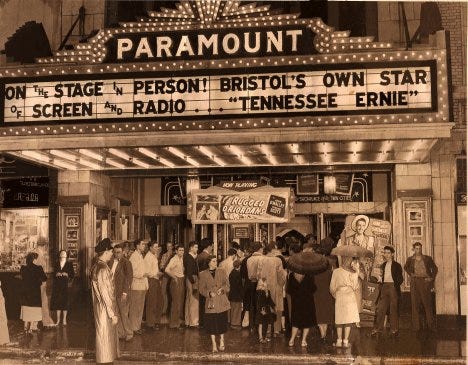
Shortly
after the invention of cinema, we had thousands of movie theaters
around the US showing a wide variety of independently-produced films on
all manner of topics. Anyone could produce a film, then screen it at
their local theater.
That
changed when Adolf Zukor founded Paramount Pictures. He pioneered the
practice of “block booking.” If small independent theaters wanted to
screen, say, the newest Mae West film, they would also need to purchase
and screen a bunch of other lessor films.
This
took away theater owners’ status as local tastemakers, and removed
their ability to cater to their own local demographics. The result was
the commoditization of movie theaters, and ultimately the rise of
blockbuster cinema.
How radio fell victim to The Cycle
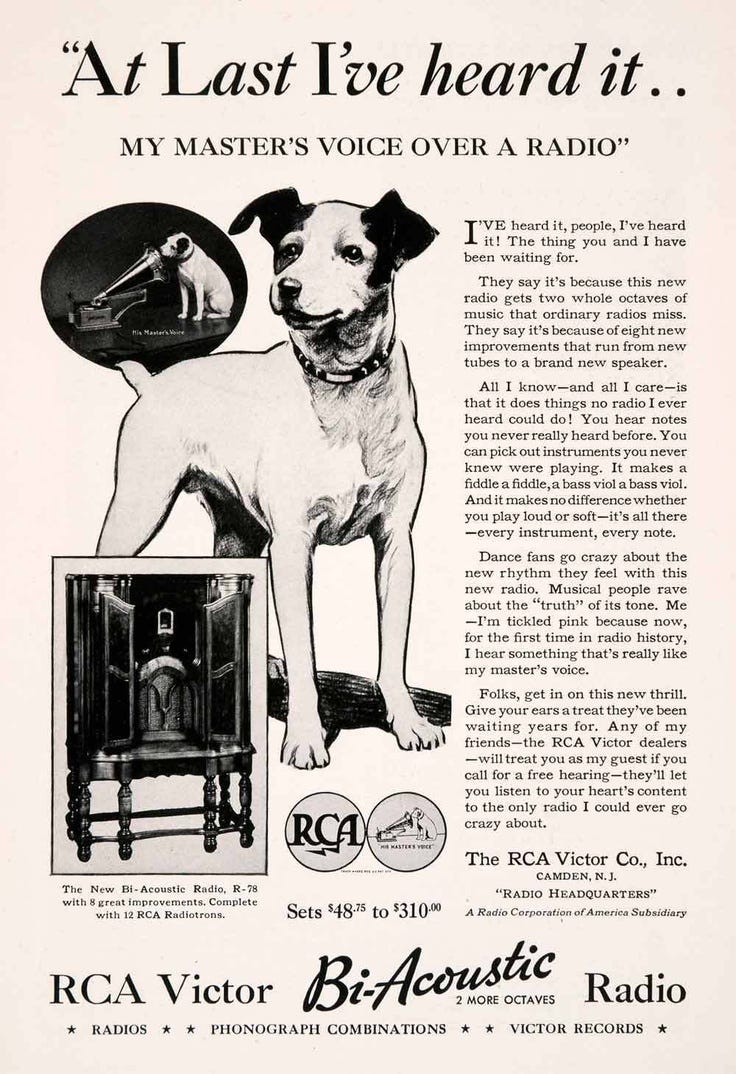
Shortly after Marconi — or Tesla
— invented the radio, a massive hobbyist movement sprung up around it.
There were thousands of local radio stations playing amateur programs.
In
stepped David Sarnoff as the head of the Radio Corporation of America
(RCA). He was perhaps the most Machiavellian CEO of the 20th century.
At
the time, RCA was making parts for radio. Conventional thinking at the
time was that RCA should focus on hardware, and getting as many radio
stations running and as many radios into homes as possible. But Sarnoff
realized that the real money was in content. He helped popularize the
National Broadcast Corporation (NBC) and focused instead on making money
through advertisements.
Then
Sarnoff approached the Federal Radio Commission — now the Federal
Communications Commission (FCC) — and convinced them that since the
radio spectrum was a scarce commodity, they should carve it up and issue
licenses.
Soon,
NBC was available in every home, and the local hobbyist radio stations
were squeezed off the air. RCA was now vertically integrated — from the
parts in the radio stations, to the parts in consumer radios, to the
content being broadcast itself.
Sarnoff
had talked with the inventors of TV, and knew that it would eventually
disrupt radio. But he had a plan. To claim the invention of television
for himself.
How TV fell victim to The Cycle
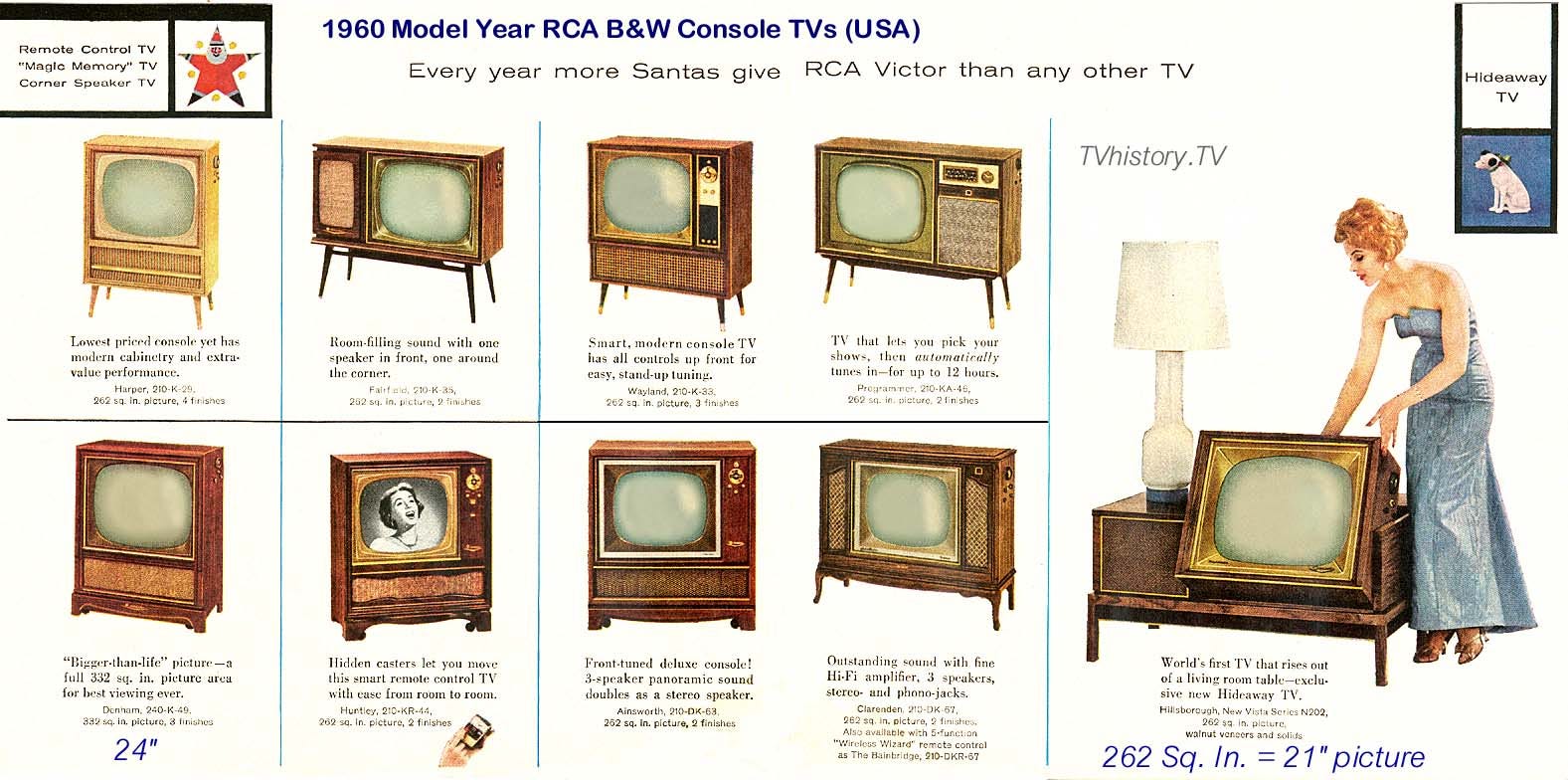
TV
is different from other forms of technology here, in that it didn’t
enjoy a hobbyist stage. With the help of the FCC, Sarnoff and RCA
immediately locked TV down. The result was several decades where
Americans had just three channels to choose from — NBC, CBS, and ABC.
This
was the height of mass culture — half of all Americans watching the
same episode of I Love Lucy at the same time. The popularity of
television — combined with the lack of diversity in programming caused
by this monopoly — had social and political consequences that haunt us
to this day.
Will the open internet fall victim to The Cycle?
We’ve gone through the invention step. The infrastructure came out of DARPA and the World Wide Web itself came out of CERN.
We’ve gone through the hobbyist step. Everyone now knows what the internet is, and some of the amazing things it’s capable of.
We’ve gone through the commercialization step. Monopolies have emerged, refined, and scaled the internet.
But
the question remains: can we break with the tragic history that has
befallen all prior information empires? Can this time be different?
Part 2: The War for Atoms
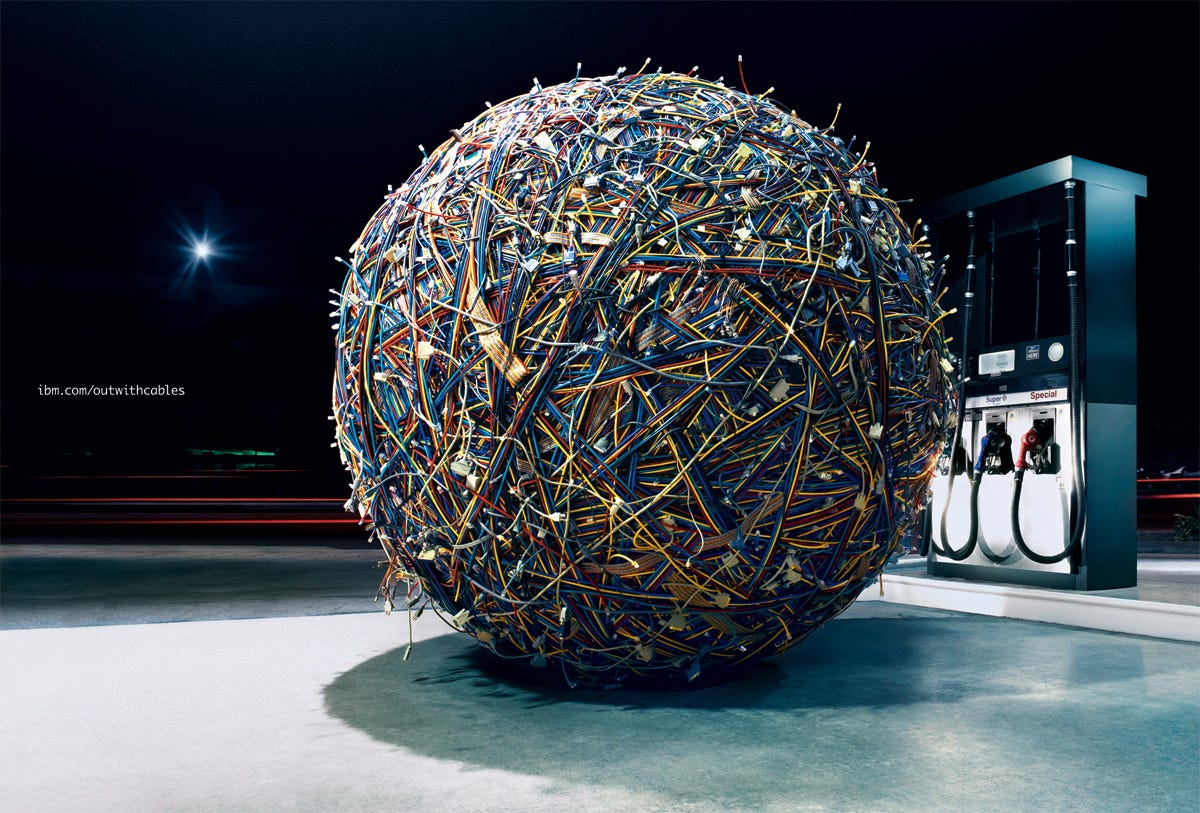
“Any sufficiently advanced technology is indistinguishable from magic.” — Arthur C. Clarke’s Third Law
As
much as we may think of the internet as a placeless realm of pure
abstractions, it has a physical structure. It’s not magic. And more
people are waking up to this reality each day.
The
internet is a series of copper and fiber optic cables that burrow
through the ground and tunnel under oceans. We call this the Internet
Backbone. Here’s what it looks like:
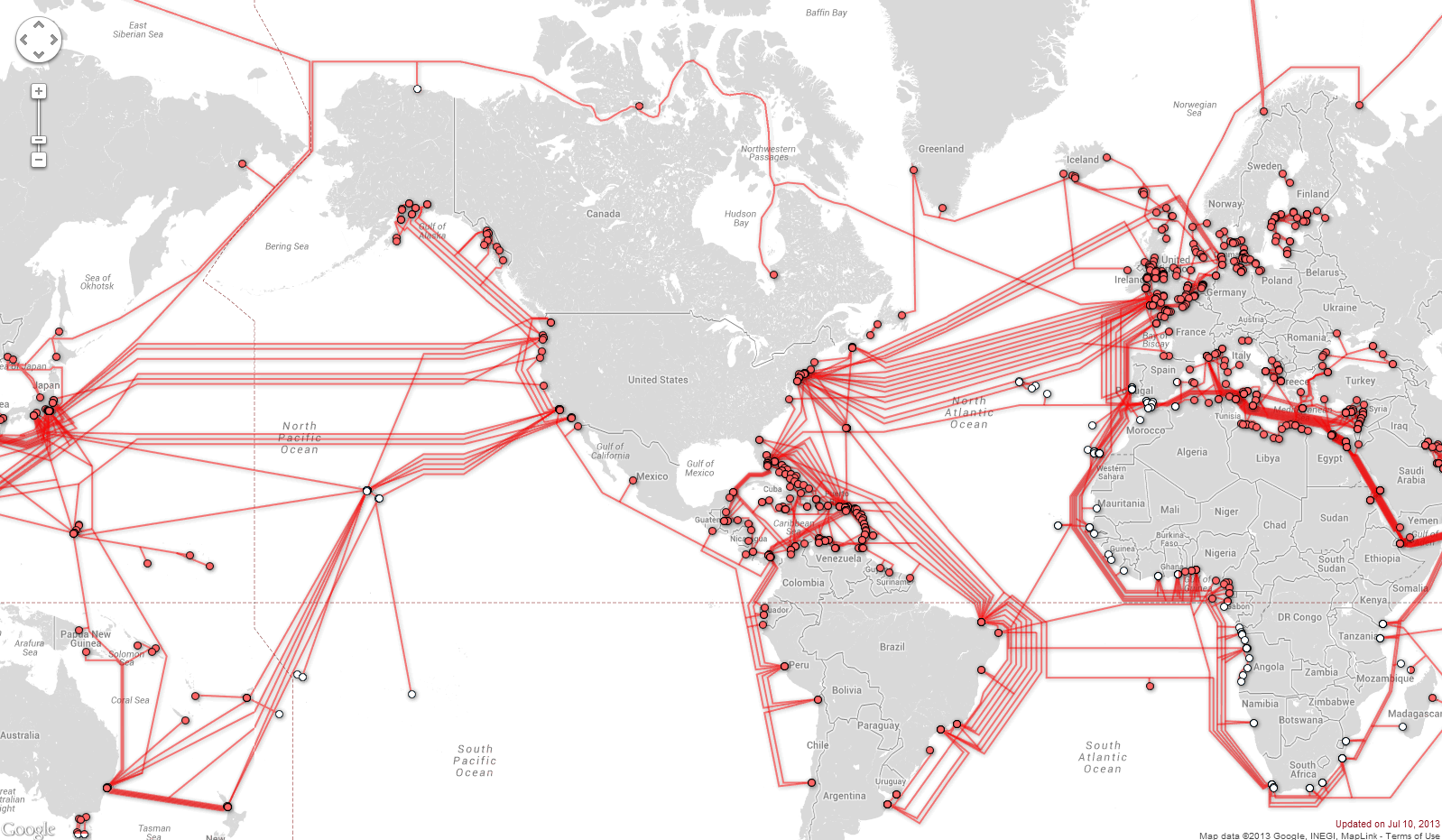
The
internet is then further distributed through regional backbones. Here’s
all the fiber that carries internet data around the United States. Red
squares represent the junctions between “long haul” fibers.

Infrastructure
The invisible workhorses of the internet: backbone providers
Six major companies control the backbone, and they “hand off” traffic from one another without any money exchanging hands:
- Level 3 Communications
- Telia Carrier
- NTT
- Cogent
- GTT
- Tata Communications.
Within
the US, the backbone is mostly controlled by old long distance
carriers, including Verizon and AT&T — who also control a two thirds
of America’s $200 billion wireless industry.
These
companies “peer” traffic through backbone connections controlled by
other companies, or pay each other through “transit agreements.”
Despite the involvement of these huge telecoms, the internet backbone represents a fairly healthy market. About 40% of the internet’s backbone is controlled by smaller networks you’ve never heard of.
The mafia of the internet: the ISPs
The
broadband internet market, on the other hand, isn’t healthy at all.
This is the “last mile” of cables that plug into the internet backbone.
And it’s full of ugly tollbooths, guarded by thick benches of lawyers
and lobbyists.
This
broadband internet market is controlled by just three extremely
powerful — and widely hated — internet service providers (ISPs):
- Cox
- Charter (which recently acquired another ISP, Time Warner)
- and the most hated corporation in America, Comcast, which controls 56% of America’s broadband
Another form of ISPs are the wireless providers:
- AT&T
- Verizon (formerly part of AT&T)
These
two providers control 2/3rd of the wireless market. If you have a
mobile phone, there’s a good chance you pay one of these companies every
month for your data plan.
These
ISPs control millions of miles of copper cables that they buried in the
ground back in the 1970s, and satellites they shot up into orbit in the
1990s. They constantly break the law,
tie up regulators in lengthy court battles, and make it practically
impossible for anyone — even Google — to enter their markets.
The
ISPs do all this for one reason and one reason alone: so they can avoid
free market competition — and the expensive technology upgrades it
would require — while they continue raking in their monopoly rents from the 2/3 of Americans who only have one choice in their neighborhood for broadband internet.
For
the past two years, the public had a weapon against these ISPs. It’s
not one that can mortally wound them , but it has helped beat back their
monopolistic tendencies. It’s called Net Neutrality.
How Net Neutrality works
The
story of ISPs basically comes down to this: They used to make a ton of
money off of cable packages. But people discovered that once they had
the internet, they didn’t care about cable TV any more — they just
wanted data plans and so they could watch YouTube, Netflix, or whatever
shows they wanted — and they could also consume a lot of non-video
content, too.
The
ISPs don’t make nearly as much selling you a data plan as they used to
make selling you a cable plan, though. So their goal is to return to the
“good old days” by locking down the internet into “channels” and
“bundles” then forcing you to buy those.
How
do we prevent this? The good news is that we already have. In 2015, the
FCC passed a law that regulated ISPs as utilities. This is based on the
principle of “Net Neutrality” which basically states that all
information passing through a network should be treated equally.
As
part of its 2015 decision on Net Neutrality, the FCC asked for public
comment on this topic. 3 million Americans wrote to the FCC. Less than 1% of those people were opposed to Net Neutrality.
After a hard fought battle against telecoms, we convinced the FCC to enshrine Net Neutrality into law.
The FCC’s Title II regulation created three “bright lines” that prevent ISPs from doing the following:
- Blocking content from websites
- Slowing down content from websites
- Accepting money from websites to speed up their content
These
rules made it so that no matter how rich and powerful a corporation
is — and Apple and Google are the biggest corporations on Earth, and
Microsoft and Facebook aren’t far behind — they can’t buy priority
access to the internet.
Everyone
has to compete on a level playing field. These tech conglomerates have
to compete with the scrappy startups, the mom-and-pop businesses, and
even independent bloggers who are running WordPress on their own domain.
Nobody
is above Net Neutrality. It’s as simple a tool as possible for
protecting the capitalist free market internet from monopolies who would
otherwise abuse their power.
Now
ISPs are treated like a utility. How are the packets being routed
through a network different from the water being piped through the
ground, or the electricity flowing through a power grid?
The water company shouldn’t care whether you’re turning on a tap to wash dishes or to take a shower.
The power company shouldn’t care whether you’re plugging in a TV or a toaster.
The ISPs shouldn’t care what data you want or what you use it for.
The
reason ISPs want to get rid of Net Neutrality is simple: if we stop
treating them like the utility that they are, they can find ways to
charge a lot more money.
Here’s the former CEO of AT&T laying out his evil plan:
“Now what they would like to do is use my pipes free, but I ain’t going to let them do that because we have spent this capital and we have to have a return on it. So there’s going to have to be some mechanism for these people who use these pipes to pay for the portion they’re using. Why should they be allowed to use my pipes? The Internet can’t be free in that sense, because we and the cable companies have made an investment and for a Google or Yahoo! or Vonage or anybody to expect to use these pipes [for] free is nuts!” — Edward Whitacre, AT&T CEO
What
he should certainly realize is that everyone is already paying for
internet access. You’re paying to be able to access this article. I’m
paying to push this article up onto the internet. This website is paying
to send the traffic from its servers over to your computer.
We have all already paid to use these ISP’s last mile of cables. No one is using these pipes for free.
But
the ISPs see an opportunity to double dip. They want to charge for
bandwidth, and also charge websites what the Mafia calls “protection
money.” They essentially want to be able to say to website owners:
“Those are some lovely data packets you’ve got there. It sure would be a
shame if they got lost on their way to your users.”
Of
course, most of the open internet couldn’t afford to pay this
“protection money” to ISPs, so the ISPs would block traffic to their
websites, cutting consumers off from most of the open internet. But the
ISPs wouldn’t need to block these websites. All the ISPs would need to
do is introduce a slight latency.
Both
Google and Microsoft have done research that shows that if you slow
down a website by even 250 milliseconds — about how long it takes to
blink your eyes — most people will abandon that website.
That’s
right — speed isn’t a feature, it’s a basic prerequisite for attracting
an audience. We humans are extremely impatient and becoming more so
with each passing year.
This means that in practice, if an ISP artificially slows down a website, it’s practically as damaging as blocking the site entirely. Both of these acts result in the same outcome — a severe loss of traffic.
Traffic
is the lifeblood of websites. Without traffic, merchandise doesn’t get
sold. Services don’t get subscribed to. Donations don’t get made.
Without traffic, the open web dies — whether ISPs block it or not.
The ISPs have launched an all-out assault on Net Neutrality
With January’s change in US administration and the election of our 45th president, the FCC has changed as well.
The
FCC Chairman Ajit Pai — a former Verizon lawyer — is now in control of
the only regulator that the ISPs answer to. And here’s a direct quote
from him:
“We need to fire up the weed whacker and remove those rules that are holding back investment, innovation and job creation.” — FCC Chairman Ajit Pai
The
ISPs won’t reinvest their “protection money” in infrastructure. They
already have incredible monopoly profits. Here’s their net income
(after-tax profits) from 2016:
- AT&T: $16 billion
- Verizon: $13 billion
- Comcast $8 billion
- Charter $8 billion
They
have plenty of profit they could claw back into improving
infrastructure. They’re choosing instead to disperse this money to
shareholders.
In just two months, Chairman Pai has already done incredible damage to Net Neutrality. He dropped Zero Rating
lawsuits against four monopolies who were in clear violation of Net
Neutrality law. Now Comcast and AT&T can continue to stream their
own video services without them counting toward customers’ data caps,
and there’s nothing the FCC will do about it.
Former
FCC Chairman Tom Wheeler did his best to reach out to Chairman Pai and
convince him of the virtues of Net Neutrality. The two were scheduled to
meet once every two weeks during Wheeler’s last 18 months in office.
But Pai cancelled every single one of these meetings.
“You have to have open networks — permissionless innovation. Period. End of discussion. They’re crucial to the future.” — Former FCC Chairman Tom Wheeler
Part 3: The War for Bits

What does a post Net Neutrality internet look like? Look no further than the Apple App store.
There
are two million apps in the app store, which shared a total of $28
billion in 2016. Apple takes a 30% commission on every sale, and made
$8.4 billion from the app store alone.
Most of the remaining $20 billion goes to just a small handful of mobile gaming companies:
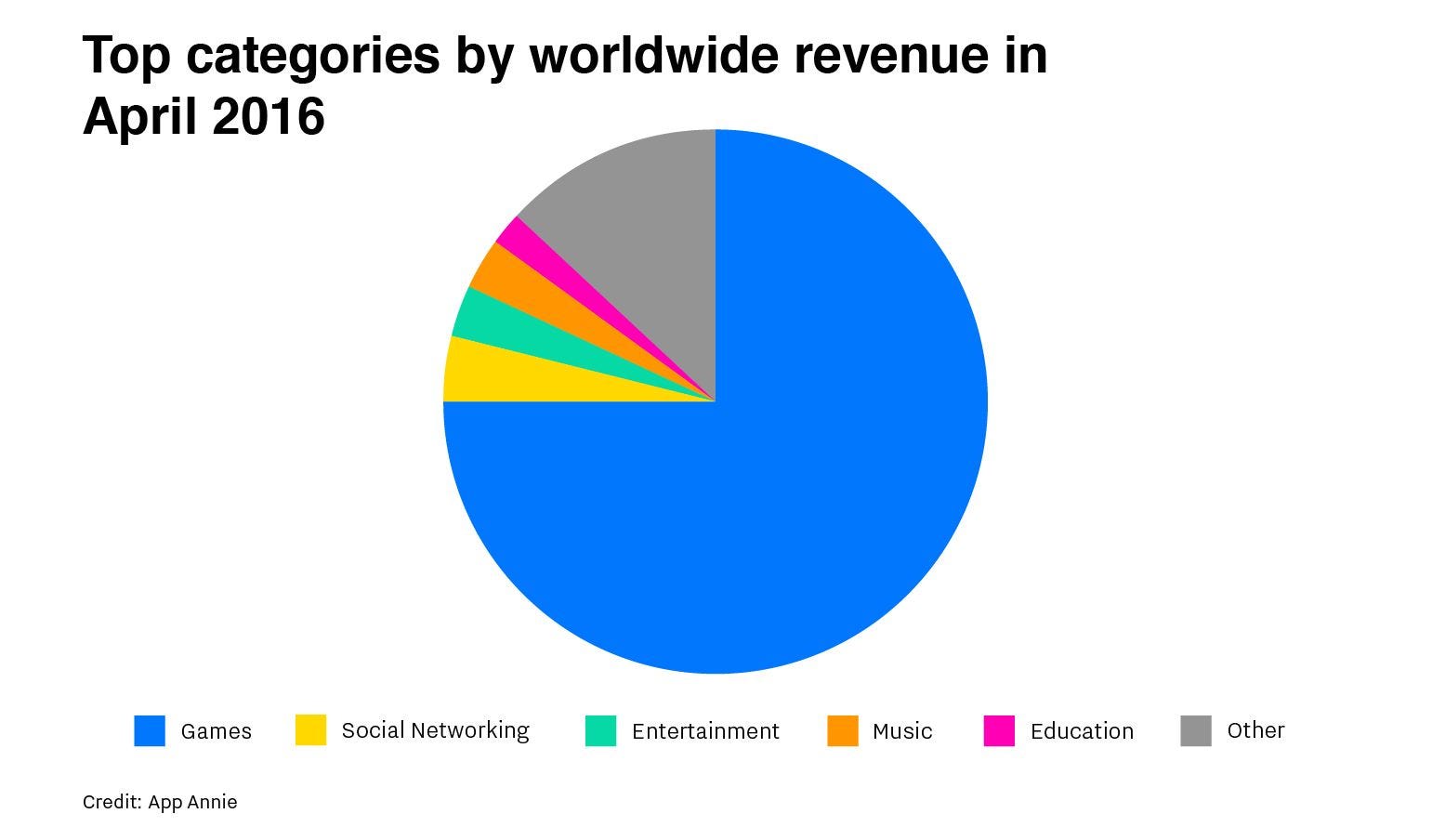
Most iPhone users download zero apps per month.
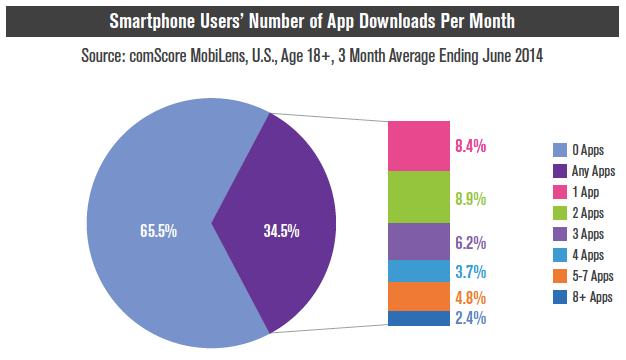
The minority who do bother to download new apps don’t end up downloading very many.
And all 8 of the top apps in the app store are owned by just two corporations: Facebook and Google.
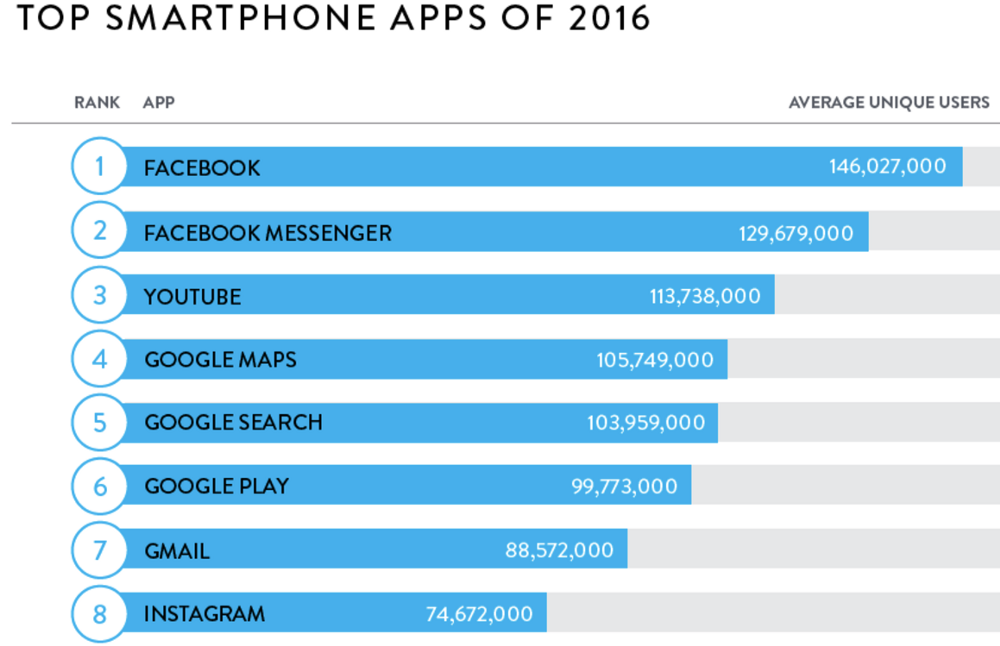
A vast majority of the remaining 2 million apps get very little traffic — and even less money.
The
Apple App Store isn’t a level playing field. It doesn’t resemble the
open internet it was built on top of. Instead, it’s an example of a
walled garden.
Walled
gardens look beautiful. They’re home to the most popular flora. But
make no mistake, you won’t be able to venture very far in any one
direction without encountering a wall.
And
every walled garden has a gatekeeper, who uproots plants that look like
weeds. If you want to plant something in a walled garden, you have to
get approval from that gatekeeper. And Apple is one of the most
aggressive gatekeepers of all. It keeps out apps that compete with its own interests, and censors apps that don’t mesh with its corporate worldview.
A brief history of walled gardens
First there was the original walled garden of the internet, AOL.
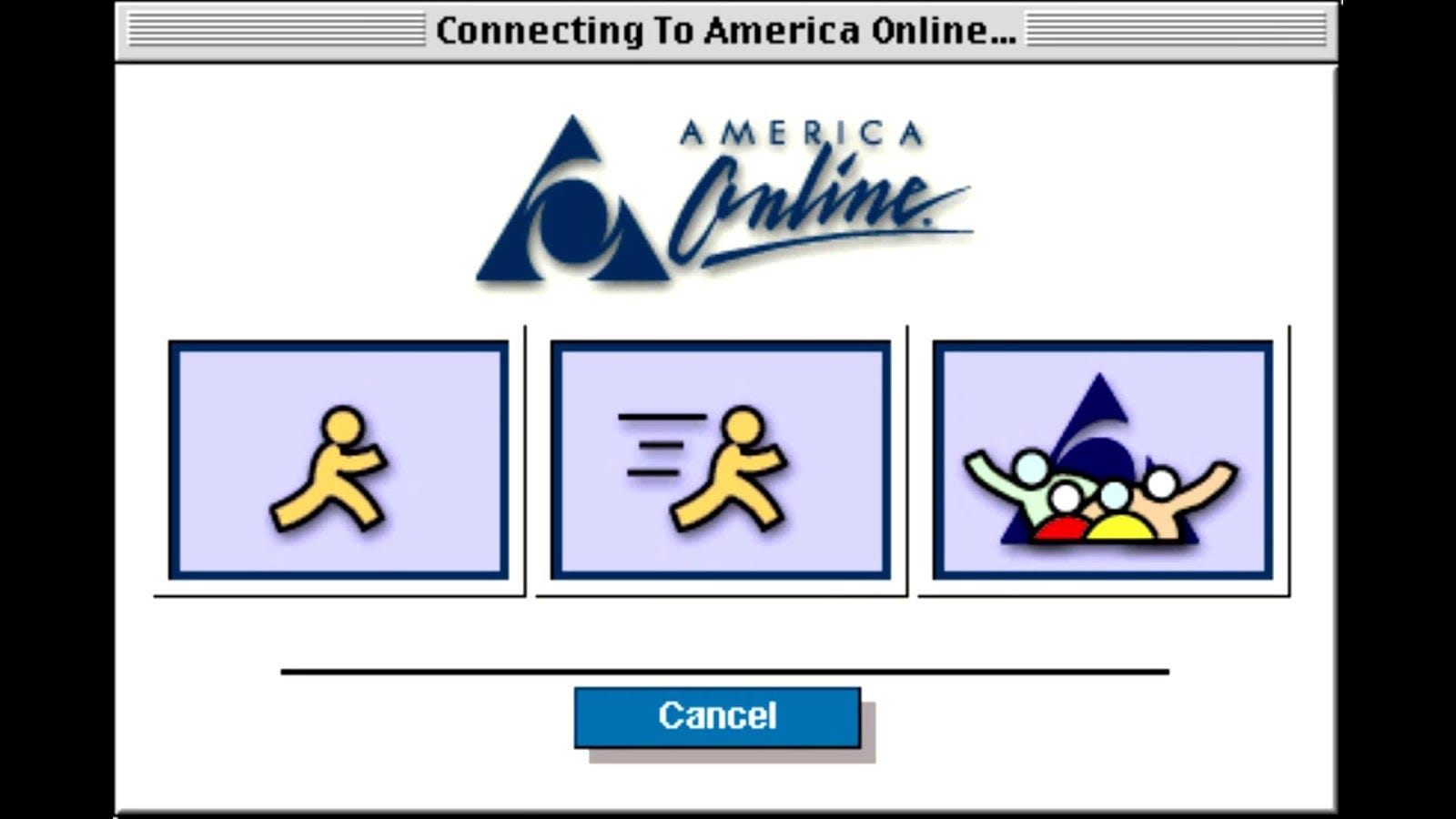
20
years later, AOL still has 2 million users paying them $20/month.
There’s a lot of money to be made in building walled gardens and
trapping users in them.
Then came Yahoo, which wasn’t a walled garden by design, but became one anyway because people were so new to the internet.
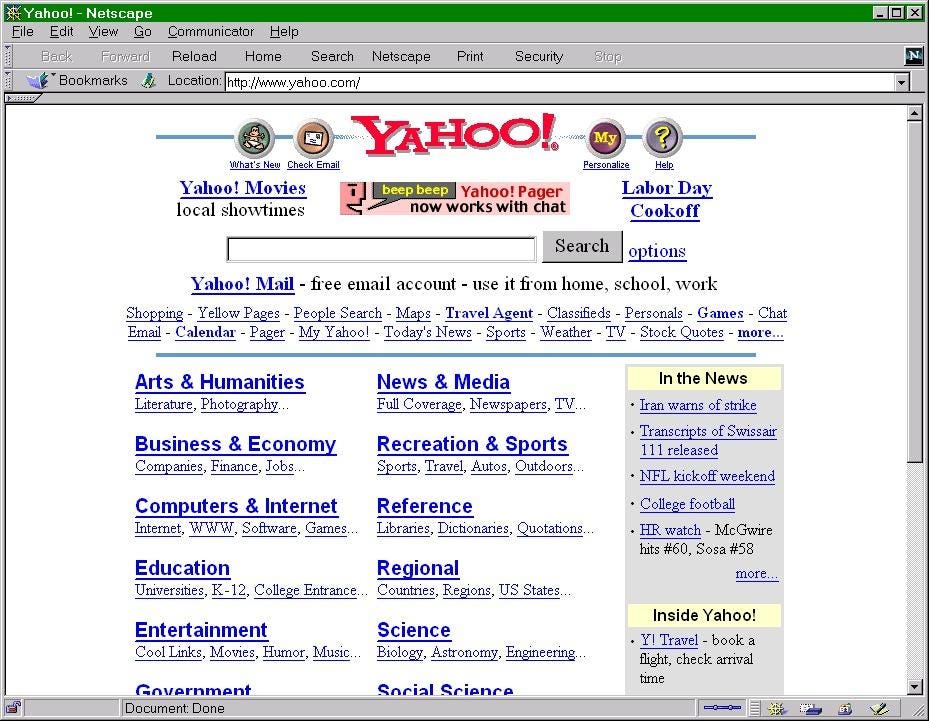
In the late 90s, startups raised money specifically so they could buy banner ads on Yahoo. It was the best way they could reach prospective users.
But Yahoo was a candle in the sun compared to the ultimate walled garden: Facebook.
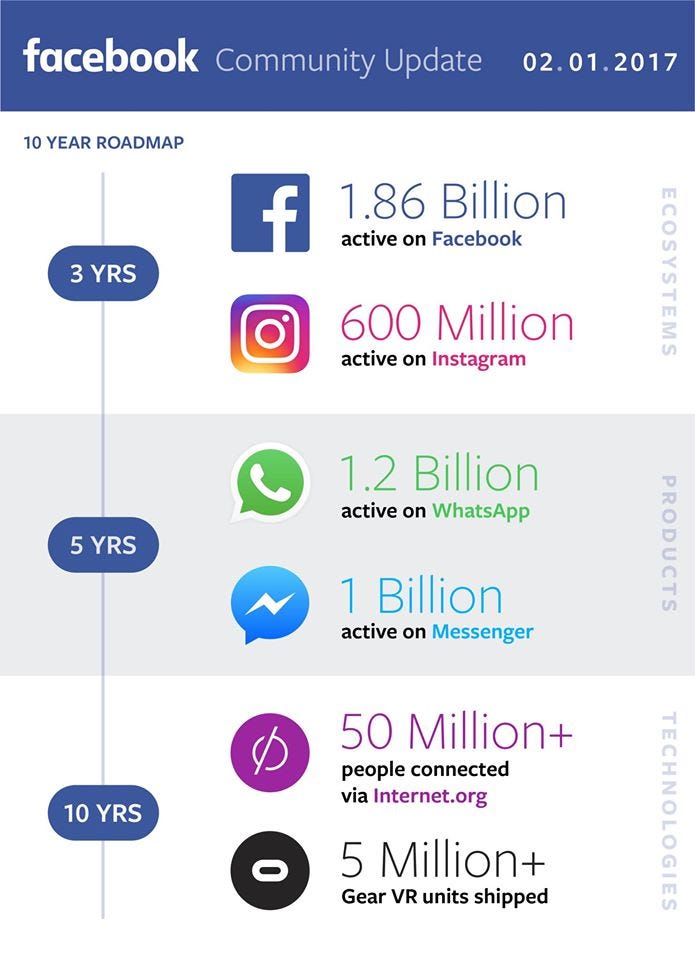
A quarter of the people on Earth use Facebook for an average of 50 minutes each day.
And
those 50 million people connected to Internet.org that Mark Zuckerberg
is bragging about? Those are people from extremely poor countries who
were given a choice: they could either pay for the open internet or just
get Facebook for free. They chose Facebook.
The insidiously-named Internet.org was famously rejected in India
— among other countries — where activists were able to raise awareness
about all the things Indians would give up by accepting Facebook instead
of the open internet.
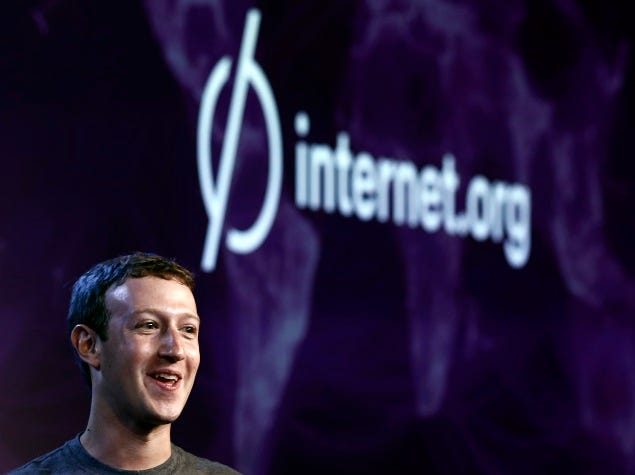
Mark Zuckerberg may mean well, but he’s rapidly destroying the open internet. In his ravenous quest to expand Facebook’s market share, he’s even gone so far as to build a sophisticated censorship tool so that Facebook can appease the governments of countries where it’s currently blocked, like China.
And
Facebook is just one of several internet corporations who stand to
profit from these sort of closed-source, closed-data walled garden
platforms.
Here are the 10 largest corporations in the world by market capitalization:
- Apple Inc
- Alphabet (Google)
- Microsoft
- Exxon Mobil
- Johnson & Johnson
- General Electric
- Amazon.com
- Wells Fargo
- AT&T
All of them are American-based multinationals. 5 out of 10 of them are internet companies, and one of them is an ISP.
Once
you look past the last gasp of the banks and the oil companies, it
becomes clear that these internet companies are the new order. They
control information. They control the conversation. They control
politics. Facebook won the new president the election — even the president and his advisors acknowledge this.
So what makes you think they won’t come to control the very internet they dominate?
Even as the costs of launching a website fall, the costs of reaching an audience continue to rise.
Facebook and Google account for 85% of all new dollars spent on online advertising.
Everyone else — newspapers, blogs, video networks — is fighting for
crumbs — the 15% that fell from Facebook’s and Google’s mouths.
Half of all internet traffic now flows to just 30 websites. The remaining half is thinly spread across the 60 trillion unique webpages currently indexed by Google.
If you’re familiar with the concept of a long tail distribution, you’ll recognize this phenomenon as an extremely fat head with an extremely long, skinny tail.
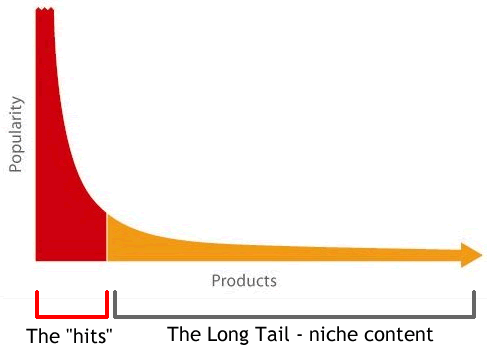
We blindly trust tech founders to be benevolent
You
may think that the Mark Zuckerbergs and the Larry Pages of the world
would know better than to abuse their power. But such scandals have
happened in the past.
Reddit
is one of the most popular websites on the internet. One of its
founders recently put the company’s reputation in jeopardy. He admitted
that he had modified users’ comments in Reddit’s database — essentially putting words in the mouths of people who were critical of him.
We
are not only placing faith in the temperament of the elite handful of
tech company founders. We’re also trusting that other actors — who
ultimately take over these organizations — will be benevolent. Even when
we know that their shareholders — or governments — can force them to be
malevolent and do things that go against their users’ interests.
However
you may feel about Mark Zuckerberg and his intentions, know this: Just
like the “benevolent monopolist” Theodore Vail, who championed rural
access to AT&T in the early 20th century, Mark Zuckerberg will one
day retire. And the person who takes over Facebook will not be nearly as
forward thinking as he is. Most likely, it will be some finance guy or
sales guy who will sell Facebook users — and their Exabytes of
data — down the river.
By destroying Net Neutrality, the ISP monopolies are herding us all into walled gardens
If we lose net neutrality, websites that once freely operated on the open internet will face three choices:
- pay ISPs so that their customers can access their website
- don’t pay ISPs, and plummet into obscurity
- become part of a walled garden that is paying ISPs on their behalf
This
last option will be the most appealing for most small businesses. They
will choose the free option. And in doing so, they’ll hand over to the
walled gardens some amount of control over their own websites.
A
Google or a Facebook will step in to help ensure that your customers
are able to access your business’s website. These walled gardens will
pay ISPs on your behalf, and help serve your content on their own
domains. But in return, the walled garden could:
- inject ads into your website (probably ads for your competitors)
- capture your data and sell it (probably to your competitors)
- redirect your customers to the websites of competitors who are willing to pay for your audience
Just
like with Google ads or Facebook ads, the internet will become a race
to see who can pay walled gardens the most money so they can gain access
to customers. And most of this will be completely invisible to
consumers.
There are precedents for all of this.
Facebook
convinced millions of businesses to setup Facebook pages. The companies
then spent their own money publicizing their Facebook pages and getting
their customers to “like” their pages. Then Facebook pulled a
bait-and-switch, and made it so these businesses would have to advertise
through Facebook if they wanted to reach their own customers who’d
previously liked their pages.
And here’s what happens when a small nonprofit like freeCodeCamp refuses to pay for Google ads:
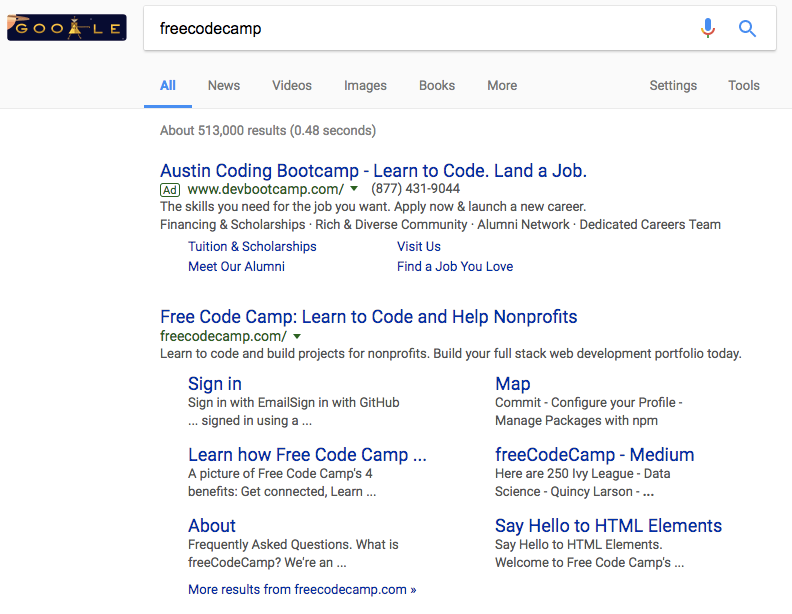
Companies
with lots of money like this one — which is a subsidiary of Kaplan, one
of the largest for-profit education conglomerates on earth — can pay
money to Google so they can intercept our users.
And
these ads will gradually look less and less like ads. Here’s how Google
ads have changed over time to look more and more like normal search
results:
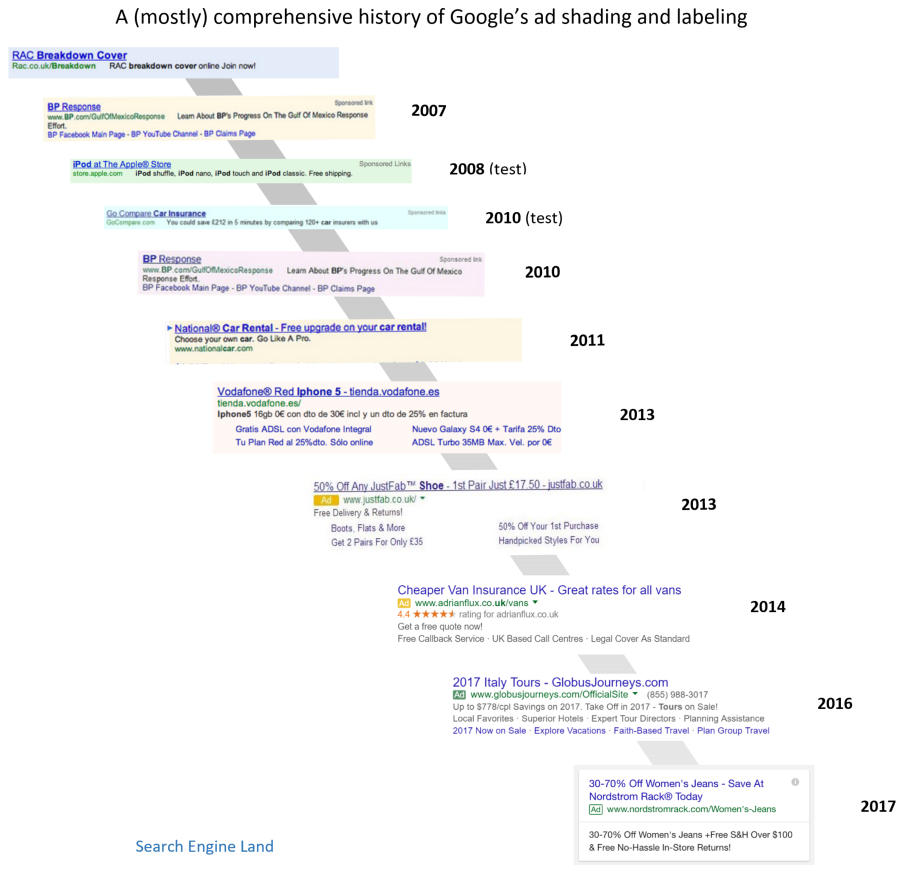
Now
that tiny, green-bordered box with the word “ad” in it is all that
distinguishes an advertisement from a legitimate search result. It is
perhaps unsurprising that 55% of Google users don’t even recognize the fact that these are ads.
Eventually
walled gardens may converge on something similar to Baidu, China’s
largest search engine, which for a long time wasn’t labelling ads at
all.
Baidu got into trouble last year
after a college student used their search engine to seek treatment for a
commonly treatable form of cancer. The student went to a hospital he
found at the top of Baidu’s search results.
What
the student didn’t know was that that hospital had paid Baidu money to
be put at the top of the search results, and that this was in fact an
advertisement. But Baidu had deliberately obscured this fact from their
users so they could charge more for the ad.
The
hospital proceeded to recommend an expensive and unproven drug instead
of the standard — and far cheaper — treatment of surgery and
chemotherapy.
After
exhausting his family’s savings of $30,o00 on the ineffective
treatment, the 21-year-old student wrote one final essay about his
situation and how Baidu had lead him right into the hands of fraudsters.
Then he died.
This
is just a glimpse into the human toll that these walled gardens can
inflict upon society. In a walled garden environment where only those
who pay money get seen, consumers will face more misinformation, more
fraud, and more needless suffering.
Instead
of the equalizing force that was the open internet, the rich will get
richer and the poor will get poorer. The internet’s promise of economic
democratization will fall by the wayside, and we’ll enter yet another
age of peasants living under feudal lords.
In the future, our internet could become as locked-down as China’s
China
has the most sophisticated censorship tools in the world. So much so
that other authoritarian regimes license the use of these tools to
control their own populations.
1.4 billion Chinese people are trapped in a closed internet, behind the Great Firewall of China.
The
anti-Net Neutrality agenda that the ISPs are pursuing would require
them to use a technique called Deep Packet Inspection. Without looking
inside the contents of every packet, it’s impossible for an ISP to
decide which packets they want to selectively slow down.
This
means that in addition to sending packets of data through their
networks, ISPs would actually have to look inside each of these
packets — and would quite likely record the contents of these packets.
It would be expensive, but storing major chunks of the Zettabyte of
information the internet generates each year is within the budgets of
large corporations and governments.
There’s a precedent for this, too. AT&T illegally monitored all of its traffic for years.
Monitoring
internet traffic at this level of detail would make pervasive
censorship possible. This is one of the techniques China uses to
re-write its history. And it works. Despite the advances in information
technology, to this day many Chinese still don’t know that the Tiananmen Massacre happened. And when they do learn of it, it’s ancient history — sapped of most of its perceived relevance.
“Ideas are more powerful than guns. We would not let our enemies have guns, why should we let them have ideas.” — Joseph Stalin
If
the ISPs succeed and the open internet falls, corporations and
governments would have a mandate to censor the most powerful
communication tool in human history — the internet — in its entirety.
Part 4: Who controls the information? Who controls the future?

Whether
these corporations are aggregating power through regulatory capture or
by amassing exabytes of your data, they are steadily becoming more
powerful. They are using their growing cashflow to buy up competitors.
This isn’t capitalism — it’s corporatism.
Capitalism is messy. It’s wasteful. But it’s much healthier in the long
run for society than central planning and governments trying to pick
the winners.
Capitalism allows for small businesses to enter the arena and actually stand a chance. Corporatism makes that unlikely.
If
you’ve read this far, I hope you understand the gravity of this
situation. This is not speculative. This is really happening. There are
historical precedents. There are present-day examples.
If
you do nothing, we will lose the war for the open internet. The
greatest tool for communication and creativity in human history will
fall into the hands of a few powerful corporations and governments.
Without your actions, corporations will continue to lock down the internet in ways that benefit them — not the public.
The
good news is that our great grandparents reined in similar monopolies.
At the beginning of the 20th century, Americans faced abusive oil,
railroad, and meat industry monopolies. We prevailed over them by
raising awareness through brave journalism, and by compelling the
government to act.
Today, our most urgent task at hand is stopping FCC Chairman Ajit Pai from disassembling Net Neutrality.
Help us fight this war. Here’s what I’m asking you to do:
- If you can afford to, donate to nonprofits who are fighting for the open internet: Free Press, the ACLU, the Electronic Frontier Foundation, and Public Knowledge.
- Educate yourself about the importance of the open internet. Read Tim Wu’s “The Master Switch: The Rise and Fall of Information Empires.” It is by far the best book on this topic.
- Contact your representatives and ask them what they’re doing to defend Net Neutrality.
- Share this article with your friends and family. I realize the irony of asking you to use walled gardens to spread the word, but this late in the game, these are the best tools available. Share this article on Facebook or tweet this article.
Only we, the public, can end The Cycle of closed systems. Only we can save the open internet.


No comments:
Write comments